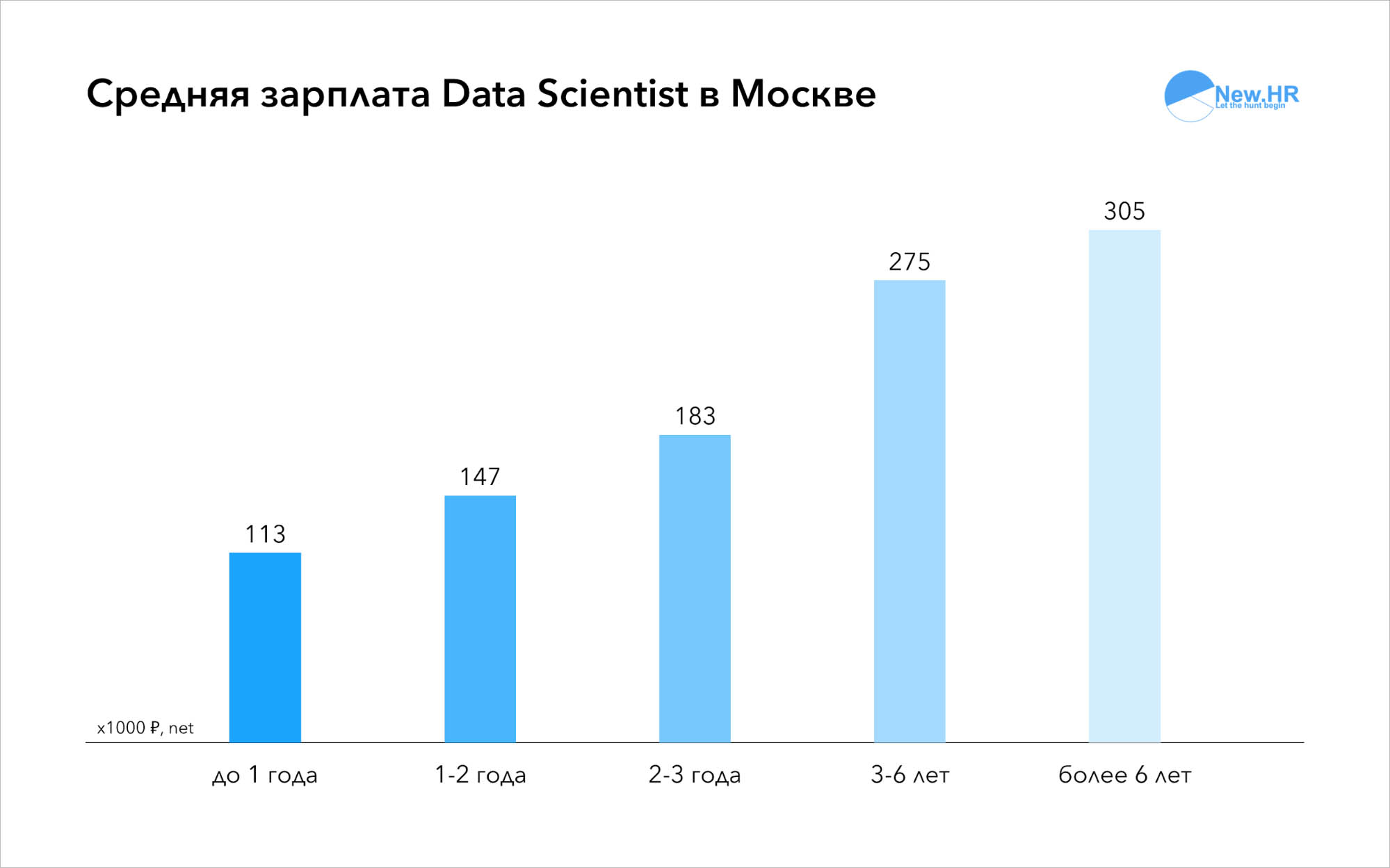Labor Market Analysts and Data Scientists
Data Science is not a new field. Data processing has been engaged for more than 50 years, which does not prevent the sphere from remaining at the peak of its popularity: data analysts and Data Scientist are in great demand among employers today. The editorial staff of Netology decided to ask the experts of the market - the agency New.HR, which specializes in the direction of Data Science, and the leading IT-companies - about the real situation in the field of work with data.
How much do specialists of different levels get? How to increase your value in the eyes of the employer? Where are companies looking for employees? What do HR look at first when choosing a candidate?
The DS labor market is developing rapidly. In the past two years alone, we have trained over 800 students in the Data Science specialization, most of them working in specialized positions in Russian and foreign companies. In total, we have more than 10 training programs on the subject of Data Science, but the most popular areas are Data Analyst, BI Analyst, Data Scientist and Machine Learning.
All students have different goals: someone comes to radically change their profession, someone to grow in their own position and start earning more. Wages, of course, one of the main reasons why there are more and more people who want to study Data Science.
')
 In June 2019, the agency New.HR will release a large market research of analysts and Data Scientist, but for now Oksana Prutyanova, head of analytics practice and Data Scientists at New.HR , agreed to share data on wages in the field and give advice to experts.
In June 2019, the agency New.HR will release a large market research of analysts and Data Scientist, but for now Oksana Prutyanova, head of analytics practice and Data Scientists at New.HR , agreed to share data on wages in the field and give advice to experts.
The data was obtained through a direct survey of Data Science specialists. The indicators received from respondents working in Moscow are taken into account. The figures of salaries are indicated after the payment of taxes, “on hands”:

What is Data Scientist income level?
There are items that add value to Data Scientist in the eyes of the employer:
In summary, we can highlight a list of tips for those data professionals who are looking to earn more. Most of them are quite versatile and banal - but nevertheless, they work:
We talked with HR managers and heads of analytics at IT companies and found out where they usually look for employees in the team, and also what they look at first when selecting candidates.
Alexandra Golovina, head of IT selection Avito :

In Avito, Data Scientist is a separate position, different from data analytics. Data analysts evaluate the quality of existing functionality or product and help make decisions about changes in them: develop and implement metrics, test hypotheses, conduct A / B tests — identify the main bottlenecks, users pains, and think about how to solve them.
Data Scientist is responsible for building ML models that help solve problems already found by data analysts: prepare data, write prototypes, etc.
Usually quite a lot of responses to both positions come to us, but, unfortunately, most resumes are irrelevant. For the most part, people did not work with algorithms, or do not own the stack we need. Therefore, most often we are looking for our own: for alternative sources (for example, competitions) and for internal recommendations.
When choosing an employee, we look at a complex of factors: what tasks the candidate solved, whether he participated in some projects, how he wants to develop, etc. It is also important for us that the candidate has a fundamental physical and mathematical education. Our employees came from different fields and companies: from FMCG to specialized competing companies, but one thing unites everyone: the presence of a fundamental education. The experience itself is also important, but the specific specifics of the company to a lesser extent.
Having a portfolio is not necessary for us, but it can greatly help the candidate during interviews.
For each unit we have a prepared test task that is as close as possible to the employee’s future tasks. This is a win-win situation for everyone: we understand the level of the candidate, and the candidate in turn learns exactly what he will have to do.
But if a person has a portfolio and he is ready to send the source code of any of his Python projects, which in his opinion well demonstrates the level of language proficiency, and is ready to explain any part of the code, or is ready to provide a solution to any competition, the technical task is unnecessary.
Nikita Pestrov, Data Science Lead, Habidatum :

At Habidatum, we create products for analyzing urban data and customer projects. Projects require data collection, such as public transport routes or real estate listings, and an understanding of how to process them. This, as well as the creation of reporting materials, the search for patterns and conclusions is usually done by the data analyst. Data Scientist develops models for these projects and injects some of them together with Data Engineer into our products and services. These two people work in tandem.
Every year for the selection of new employees in analytics, we conduct team internships. Within a few weeks, young specialists from different areas conduct research, try out the real tasks that we face in the company. During this time we manage to understand the strengths of a person and make a decision to continue working with him.
We also conduct workshops and lectures on various topics, after which we receive a summary from interested specialists and are happy to review them. And of course the #jobs channel in the community of Open Data Science - when we are actively looking for a person for a specific task.
For young innovative companies, the knowledge and desire of a new employee to develop in the company's field of activity (for us is a city) is more important than his knowledge in a specific position. Therefore, when selecting candidates, we look for a person’s interest in urban issues, teamwork experience and the ability to turn complex conditions into simple models. In summary, this can be seen by participating in relevant conferences, internships or projects on topics of interest to us.
Vera Mashkova, Vice President, Human Resources, ABBYY Group of Companies :

In various companies, Data Scientist can refer to people with different tasks. We are mainly employed universal staff who are engaged in data analysis and development of 50/50. This is a necessity of our business.
The company has Data Scientist positions, including as part of a large internship program, but we do not translate them as a “data analyst,” but rather, “researchers” in two advanced research and development departments. Such positions we call most often Junior Data Scientist (NLP).
The popularity of Data Science is growing. The market has become more developed, many universities have begun to more actively teach the science of data. There are many additional courses. An increasing number of candidates are redeveloped.
The largest external recruitment ground is HeadHunter. In addition, we are happy to employ children from our two departments in MIPT. There are good and structured resumes, but not all candidates can describe their experience. To help novice specialists in this, we hold career development meetings for HSE and MIPT students.
We also have a developed referral program within the company: colleagues advise their acquaintances as candidates for open positions - so often we receive very good recommendations.
When choosing an employee, we primarily pay attention to basic education: which university and in what direction a person graduated from or ends.
If a candidate has a non-core (for example, humanitarian) education, he will most likely not be able to cope with his tasks. The most important thing for us is the readiness to study, the readiness for independent research, if we are talking about advanced research and development teams.
If a person is engaged in scientific activities, this, of course, is a plus. Portfolio is not necessary for us if a person comes to the position of junior specialist.
Alexey Kuzmin, development director, head of DS-direction in DomKlik :

In DomKlik we do not share the position of Data Scientist and data analytics. We clearly have a different role - analyst / business analyst. His main task is to build business reporting. Data Scientist is engaged in building models and obtaining insights from data based on machine learning. The responsibility of the data analyst is approximately in the middle, and therefore the tasks are divided approximately in half. A part is given to the stream of “business analyst”, and a part to the direction Data Science.
In my opinion, the labor market in the field of Data Science is now very overheated - high demand with a small number of really competent specialists. Therefore, when searching, we use either thematic communities and groups, or try to actively use internal recommendations.
When choosing a candidate, first of all we look at previous jobs and tasks. The presence of a portfolio is not necessary, but is welcome, as it helps the applicant to understand what tasks he has solved before and with what kind of experience he can strengthen our team. We are faced with a very wide range of tasks (from computer vision to word processing and audio signals), and we also need very different competencies.
We try to study all the resumes sent, the only taboo is when a person who responded to the position of Data Scientist does not have a single line in the resume with skills in Data Science. In this case, it is not very clear what a person is counting on, since even an expert without experience should have at least some training in the field.
Dmitry Malkov, project manager at Data Monsters , head of educational and research projects at the Laboratory of Business Solutions based on MIPT Artificial Intelligence :

In our company, Data Scientist's position requires knowledge of mathematics and Python, while a data analyst may have a liberal arts education. For example, we have a number of projects with professional historians on economic statistics. The analyst is required to manually work with data and a deeper immersion into the subject area.
We pay great attention to the training of personnel to replace them from a young age: we conduct courses for high school students in the Physics and Mathematics Department of schools, and work with university students. We have to wait for results for a long time, but they justify themselves - this is how truly “our” people are formed. As for experienced, dear employees, then we approach carefully. It is not enough just to place a vacancy and select respondents. Fortunately, there are many mature specialists among graduates of MIPT.
We note that in the past few years, more and more people, not only physicists, are interested in a career at the intersection of science and business, and we have a wide scope for such work and interesting international projects.
When selecting candidates, we try to take people on a personal recommendation.
Well, well, if, in addition to mathematics, a person has subject knowledge.
We are worried about candidates who jump from one company to another and work in incomprehensible positions. For example, now the direction of machine learning is at the peak of popularity, but we exclude those who come into the profession because of HYIP. Last year they did blockchain, AI is doing it. For science, after all, many years of work and a corresponding outlook are needed.
Maxim Chikurov, an expert in Data Science in Netology and head of the analytics team at a large Russian bank , believes that despite the development of the labor market in Data Science, it cannot be called very dynamic:

In the banking industry, in my opinion, Data Science is less relevant than data analysis.
The peculiarity of the sphere now is a large number of those who want to "enter the profession." Such applicants require a creative approach, since resumes with the title Data Scientist, but without relevant experience, are of little interest. I advise, for example, to create a video presentation of my research, this will greatly raise you among other applicants. On the other hand, employers also often have overstated expectations from Data Science as a whole, and, as a result, from candidates. Therefore, a full-fledged "supply-demand" relationship does not work.
Almost all the experts noted the lack of competent specialists in the market and the fact that companies constantly have new requirements for candidates in the field of Data Science. Therefore, those who wish to keep up with the pace of the market should invest as much as possible in the development of themselves as a specialist: independently read educational materials, study case studies and articles of practitioners, participate in workshops, internships, take courses. All this will allow you to remain in demand and receive decent wages.
How much do specialists of different levels get? How to increase your value in the eyes of the employer? Where are companies looking for employees? What do HR look at first when choosing a candidate?
The DS labor market is developing rapidly. In the past two years alone, we have trained over 800 students in the Data Science specialization, most of them working in specialized positions in Russian and foreign companies. In total, we have more than 10 training programs on the subject of Data Science, but the most popular areas are Data Analyst, BI Analyst, Data Scientist and Machine Learning.
All students have different goals: someone comes to radically change their profession, someone to grow in their own position and start earning more. Wages, of course, one of the main reasons why there are more and more people who want to study Data Science.
')
How much is paid on the position of Data Scientist
 In June 2019, the agency New.HR will release a large market research of analysts and Data Scientist, but for now Oksana Prutyanova, head of analytics practice and Data Scientists at New.HR , agreed to share data on wages in the field and give advice to experts.
In June 2019, the agency New.HR will release a large market research of analysts and Data Scientist, but for now Oksana Prutyanova, head of analytics practice and Data Scientists at New.HR , agreed to share data on wages in the field and give advice to experts.The data was obtained through a direct survey of Data Science specialists. The indicators received from respondents working in Moscow are taken into account. The figures of salaries are indicated after the payment of taxes, “on hands”:

What is Data Scientist income level?
- general professional experience;
- depth of professional expertise;
- education in the status and quoted university. For example, strong analysts are trained at the Moscow Institute of Physics and Technology, Moscow State University, ITMO;
- location - in Moscow there is more money. But even in the regions you can earn comparable money. For example, in cities with a strong academic base, such as Novosibirsk. Also it is possible to count on the capital level of the salary, working on the project remotely;
- Knowledge of English greatly expands opportunities and allows you to be in the global professional community. Follow publications, study according to the programs of the best world universities, consider vacancies abroad, write articles in English.
How Data Scientist Increases Its Value in the Labor Market
There are items that add value to Data Scientist in the eyes of the employer:
- Knowledge of unique technology. When an expert becomes an expert in a narrow professional field, for example, he is cool in NLP - this increases his value in the market.
- Experience in the developed, HYIP field: everything related to computer vision, robotics, drones, and so on. The cost of a specialist depends on the intersection of market demand, general trends and knowledge of a specific, narrow segment.
- Diverse experience. Some employers consider specialists only from their field, for example, from banks. But those who look more widely and invite analysts from other areas benefit. Because a candidate can bring in a new vision, apply unobvious tools and approaches.
- Experience creating your own startup. For the employer, this means that the specialist can understand the tasks at the business level.
- Participation in international projects. You can get a grant or take part in a competition for Kaggle .
- Experience in foreign companies. Foreign companies have adopted other standards and approaches to business, and this is appreciated in Russian companies.
In summary, we can highlight a list of tips for those data professionals who are looking to earn more. Most of them are quite versatile and banal - but nevertheless, they work:
- Constantly learn and develop their expertise point. To do this, it is important to follow the market trends in order to pump the sought-after competencies.
- To be able to speak the language of business. Be proactive, understand and communicate the benefits of their work to managers.
- To form a team around you. You can become a leader or team lead of a small team or an educational project. Management experience at any level is required.
- The Data Scientist profession is in high demand in the market. Therefore, there is a lazy way - just to move from company to company. So you can increase the level of income by 20-30%. But this can only be done to a certain level.
What do employers think about Data Scientist
We talked with HR managers and heads of analytics at IT companies and found out where they usually look for employees in the team, and also what they look at first when selecting candidates.
Alexandra Golovina, head of IT selection Avito :

In Avito, Data Scientist is a separate position, different from data analytics. Data analysts evaluate the quality of existing functionality or product and help make decisions about changes in them: develop and implement metrics, test hypotheses, conduct A / B tests — identify the main bottlenecks, users pains, and think about how to solve them.
Data Scientist is responsible for building ML models that help solve problems already found by data analysts: prepare data, write prototypes, etc.
Usually quite a lot of responses to both positions come to us, but, unfortunately, most resumes are irrelevant. For the most part, people did not work with algorithms, or do not own the stack we need. Therefore, most often we are looking for our own: for alternative sources (for example, competitions) and for internal recommendations.
When choosing an employee, we look at a complex of factors: what tasks the candidate solved, whether he participated in some projects, how he wants to develop, etc. It is also important for us that the candidate has a fundamental physical and mathematical education. Our employees came from different fields and companies: from FMCG to specialized competing companies, but one thing unites everyone: the presence of a fundamental education. The experience itself is also important, but the specific specifics of the company to a lesser extent.
Having a portfolio is not necessary for us, but it can greatly help the candidate during interviews.
For each unit we have a prepared test task that is as close as possible to the employee’s future tasks. This is a win-win situation for everyone: we understand the level of the candidate, and the candidate in turn learns exactly what he will have to do.
But if a person has a portfolio and he is ready to send the source code of any of his Python projects, which in his opinion well demonstrates the level of language proficiency, and is ready to explain any part of the code, or is ready to provide a solution to any competition, the technical task is unnecessary.
Nikita Pestrov, Data Science Lead, Habidatum :

At Habidatum, we create products for analyzing urban data and customer projects. Projects require data collection, such as public transport routes or real estate listings, and an understanding of how to process them. This, as well as the creation of reporting materials, the search for patterns and conclusions is usually done by the data analyst. Data Scientist develops models for these projects and injects some of them together with Data Engineer into our products and services. These two people work in tandem.
Every year for the selection of new employees in analytics, we conduct team internships. Within a few weeks, young specialists from different areas conduct research, try out the real tasks that we face in the company. During this time we manage to understand the strengths of a person and make a decision to continue working with him.
We never took an analyst or Data Scientist without first working with a candidate as part of an internship.
We also conduct workshops and lectures on various topics, after which we receive a summary from interested specialists and are happy to review them. And of course the #jobs channel in the community of Open Data Science - when we are actively looking for a person for a specific task.
For young innovative companies, the knowledge and desire of a new employee to develop in the company's field of activity (for us is a city) is more important than his knowledge in a specific position. Therefore, when selecting candidates, we look for a person’s interest in urban issues, teamwork experience and the ability to turn complex conditions into simple models. In summary, this can be seen by participating in relevant conferences, internships or projects on topics of interest to us.
Vera Mashkova, Vice President, Human Resources, ABBYY Group of Companies :

In various companies, Data Scientist can refer to people with different tasks. We are mainly employed universal staff who are engaged in data analysis and development of 50/50. This is a necessity of our business.
The company has Data Scientist positions, including as part of a large internship program, but we do not translate them as a “data analyst,” but rather, “researchers” in two advanced research and development departments. Such positions we call most often Junior Data Scientist (NLP).
The popularity of Data Science is growing. The market has become more developed, many universities have begun to more actively teach the science of data. There are many additional courses. An increasing number of candidates are redeveloped.
The largest external recruitment ground is HeadHunter. In addition, we are happy to employ children from our two departments in MIPT. There are good and structured resumes, but not all candidates can describe their experience. To help novice specialists in this, we hold career development meetings for HSE and MIPT students.
We also have a developed referral program within the company: colleagues advise their acquaintances as candidates for open positions - so often we receive very good recommendations.
When choosing an employee, we primarily pay attention to basic education: which university and in what direction a person graduated from or ends.
If a candidate has a non-core (for example, humanitarian) education, he will most likely not be able to cope with his tasks. The most important thing for us is the readiness to study, the readiness for independent research, if we are talking about advanced research and development teams.
It is important to be ready to introduce new ideas.
If a person is engaged in scientific activities, this, of course, is a plus. Portfolio is not necessary for us if a person comes to the position of junior specialist.
Alexey Kuzmin, development director, head of DS-direction in DomKlik :

In DomKlik we do not share the position of Data Scientist and data analytics. We clearly have a different role - analyst / business analyst. His main task is to build business reporting. Data Scientist is engaged in building models and obtaining insights from data based on machine learning. The responsibility of the data analyst is approximately in the middle, and therefore the tasks are divided approximately in half. A part is given to the stream of “business analyst”, and a part to the direction Data Science.
In my opinion, the labor market in the field of Data Science is now very overheated - high demand with a small number of really competent specialists. Therefore, when searching, we use either thematic communities and groups, or try to actively use internal recommendations.
When choosing a candidate, first of all we look at previous jobs and tasks. The presence of a portfolio is not necessary, but is welcome, as it helps the applicant to understand what tasks he has solved before and with what kind of experience he can strengthen our team. We are faced with a very wide range of tasks (from computer vision to word processing and audio signals), and we also need very different competencies.
We try to study all the resumes sent, the only taboo is when a person who responded to the position of Data Scientist does not have a single line in the resume with skills in Data Science. In this case, it is not very clear what a person is counting on, since even an expert without experience should have at least some training in the field.
Dmitry Malkov, project manager at Data Monsters , head of educational and research projects at the Laboratory of Business Solutions based on MIPT Artificial Intelligence :

In our company, Data Scientist's position requires knowledge of mathematics and Python, while a data analyst may have a liberal arts education. For example, we have a number of projects with professional historians on economic statistics. The analyst is required to manually work with data and a deeper immersion into the subject area.
We pay great attention to the training of personnel to replace them from a young age: we conduct courses for high school students in the Physics and Mathematics Department of schools, and work with university students. We have to wait for results for a long time, but they justify themselves - this is how truly “our” people are formed. As for experienced, dear employees, then we approach carefully. It is not enough just to place a vacancy and select respondents. Fortunately, there are many mature specialists among graduates of MIPT.
We note that in the past few years, more and more people, not only physicists, are interested in a career at the intersection of science and business, and we have a wide scope for such work and interesting international projects.
When selecting candidates, we try to take people on a personal recommendation.
We draw attention to the previous work experience and the closeness of a person to us in spirit.
Well, well, if, in addition to mathematics, a person has subject knowledge.
We are worried about candidates who jump from one company to another and work in incomprehensible positions. For example, now the direction of machine learning is at the peak of popularity, but we exclude those who come into the profession because of HYIP. Last year they did blockchain, AI is doing it. For science, after all, many years of work and a corresponding outlook are needed.
Maxim Chikurov, an expert in Data Science in Netology and head of the analytics team at a large Russian bank , believes that despite the development of the labor market in Data Science, it cannot be called very dynamic:

In the banking industry, in my opinion, Data Science is less relevant than data analysis.
The peculiarity of the sphere now is a large number of those who want to "enter the profession." Such applicants require a creative approach, since resumes with the title Data Scientist, but without relevant experience, are of little interest. I advise, for example, to create a video presentation of my research, this will greatly raise you among other applicants. On the other hand, employers also often have overstated expectations from Data Science as a whole, and, as a result, from candidates. Therefore, a full-fledged "supply-demand" relationship does not work.
Almost all the experts noted the lack of competent specialists in the market and the fact that companies constantly have new requirements for candidates in the field of Data Science. Therefore, those who wish to keep up with the pace of the market should invest as much as possible in the development of themselves as a specialist: independently read educational materials, study case studies and articles of practitioners, participate in workshops, internships, take courses. All this will allow you to remain in demand and receive decent wages.
From the Editor
- profession " Data Scientist "
- Profession " Data Analyst "
- online course " Python to work with data "
- online course " Power BI & Excel PRO "
We are also waiting for everyone who is interested in the Data Science field at the “ Career in Data Science for Beginners ” meeting on August 11 in Moscow (there will also be a broadcast)
Source: https://habr.com/ru/post/454320/
All Articles